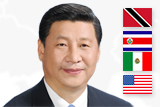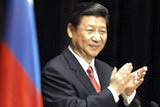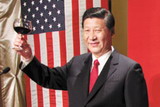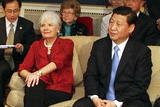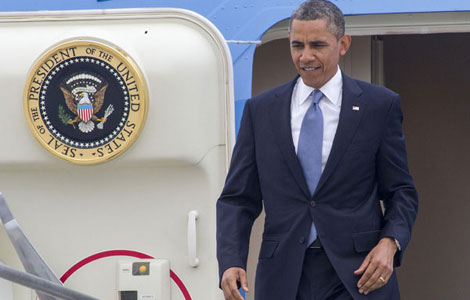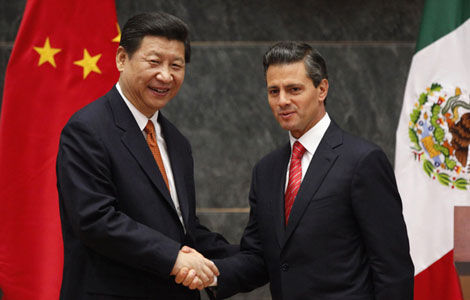
Turning a dream of China into a tale of tortillas
Updated: 2013-06-07 01:45
By Mike Peters (China Daily)
|
|||||||||
Pablo Pasapera vividly remembers the China dream that brought him to Beijing eight years ago. Like many business executives who have looked East in the past decade, he and his Mexican partners were all about the numbers.
"We thought, 'If each Chinese would eat one tortilla each day'," he said. "Of course, it's not that easy."
When he arrived in China to bring traditional tortillas — made of corn flour, not wheat — he found himself in a country that didn't know much about Mexico or its food traditions. And in a huge land where rice and noodles are king, people didn't have much enthusiasm for corn.
"They saw it as pig food," Pasapera said.
While today it's much easier for foreign businesses to enter the Chinese market, back in 2005 it was an uphill battle just to get started.
"It took us two years to register the company," he said, but that experience and the years of observation since have taught him a great deal about doing business here.
"People who graduate from college and jump over here to start a business are not going to make it," he said. China is a very good business opportunity for business professionals, he added, but even big outfits such as McDonalds and Starbucks started slowly and invested a lot of money and marketing to give them staying power.
"Thirty years ago, when KFC entered the China market, they only had a few stores seven years later," he said. "Today, of course, KFC is everywhere."
Doing business in China is like business anywhere, he said. "As a professional, you have to be prepared to make an investment of time and money."
That's why Pasapera is still here, even though he has yet to put a tortilla in the mouth of every Chinese.
"We could probably grow our business very quickly by making flour as well as corn tortillas," he said. That market is three times bigger, partly because if you can make flour tortillas you can also make Chinese food products such as the pancakes for Peking duck.
"But my backers are corn people, and the corn product is what sets us apart," he said.
His company, Mexiao Xiaobing, also prides itself on quality. Large commercial factories use a process that dries out the dough as they make tortillas, he said. "They are easier to package and ship, but when you try to make a platter of enchiladas, the tortillas break apart," he said.
Running a smaller factory and delivering fresh to restaurants, Pasapera said his employees can make tortillas that still have some elasticity.
A little like himself.
"You have to be able to adapt, to cope with the unexpected," he said.
"In Mexico, it doesn't matter if you are rich or poor, when you come home from work you are probably going to your kitchen to make a taco or something with a tortilla," he said.
Because it is a staple food, he added, tortilla makers don't pay tax in Mexico.
"In Mexico City, Monterrey and Guadalajara, presentations about investing in China indicate that you won't pay tax in China either, and that labor is cheap and all of that.
"But the reality is that we pay taxes here like anybody anywhere — and the labor market is quite sophisticated," he said.
Urban Chinese workers are looking for a certain level of salary and benefits, especially from a foreign employer, even if they are young and inexperienced, he said.
"So making a kilogram of tortilla may cost seven yuan ($1.14) in Mexico and 40 yuan in Beijing. That's not good or bad, it's just the bottom line."
While Pasapera has been in China long enough to see many Mexican restaurants come and go, he still sees great potential in the market for Western-style cuisine.
When the World Cup qualifiers were going on in his early years in Beijing, Pasapera opened a taqueria, or taco restaurant.
Soon he was packing in expat soccer fans and their friends, he said.
China's growing economy continues to be inviting for those who want to introduce a good product, he said. In time, perhaps, Chinese consumers will decide that pigs have had a good deal for too long.
Related Stories
Presidents of China, Mexico attend entrepreneur conference 2013-06-06 17:26
Chinese president receives key to Mexico City 2013-06-06 15:41
Peng visits children's hospital in Mexico City 2013-06-06 14:43
China-Mexico ties face unprecedented opportunity: Xi 2013-06-06 14:25
Xi urges to expand economic co-op with Mexico 2013-06-06 13:56
China, Mexico boost relations 2013-06-06 07:58
Xi delivers speech on ties with Mexico, LatAm 2013-06-06 04:50
China, Mexico pledge to deepen co-op in economy, trade 2013-06-05 17:42
Schedule
